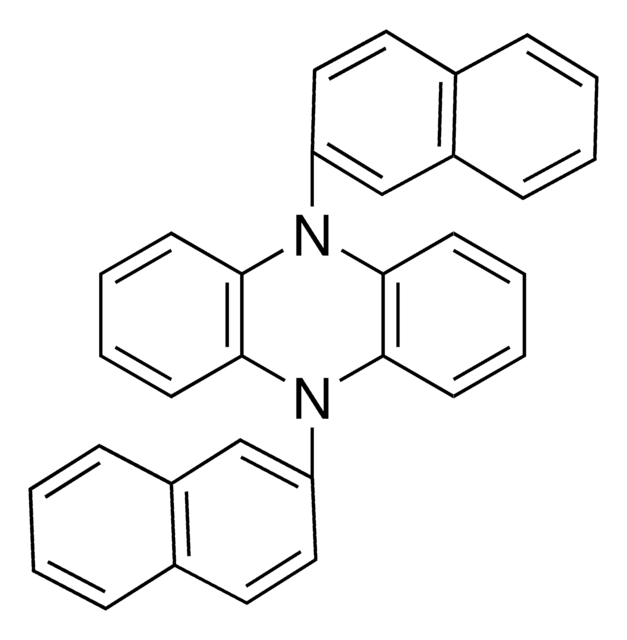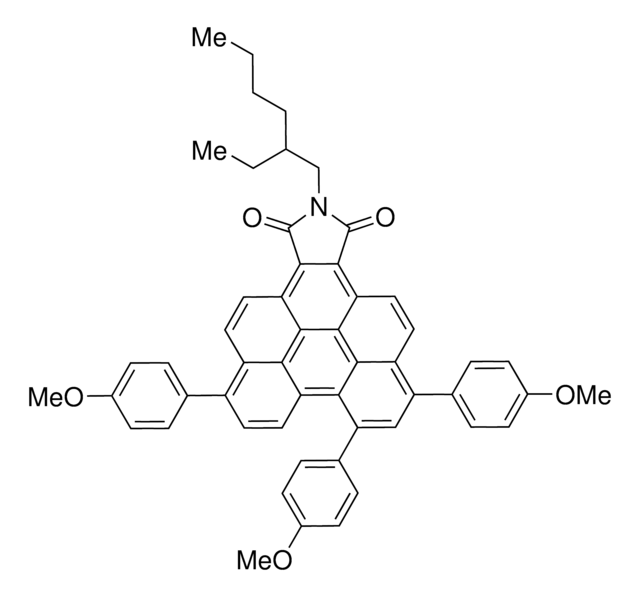916722
Phenyl-(benzo)phenothiazine
Synonyme(s) :
Ph-benzoPTZ, Phenyl-benzo[b]phenothiazine
Se connecterpour consulter vos tarifs contractuels et ceux de votre entreprise/organisme
About This Item
Formule empirique (notation de Hill):
C22H15NS
Numéro CAS:
Poids moléculaire :
325.43
Code UNSPSC :
12352200
Nomenclature NACRES :
NA.22
Produits recommandés
Forme
powder
Niveau de qualité
Capacité de réaction
reaction type: Photocatalysis
Pertinence de la réaction
reagent type: catalyst
Pf
160-167 °C
Application
Phenyl-(benzo)phenothiazine is an organic photo-catalyst used in synthesis of small molecules as well as polymerization reactions.
Product can be used with our line of photoreactors: Including Penn PhD (Z744035) & SynLED 2.0 (Z744080)
Product can be used with our line of photoreactors: Including Penn PhD (Z744035) & SynLED 2.0 (Z744080)
Produit(s) apparenté(s)
Réf. du produit
Description
Tarif
Code de la classe de stockage
11 - Combustible Solids
Classe de danger pour l'eau (WGK)
WGK 3
Point d'éclair (°F)
Not applicable
Point d'éclair (°C)
Not applicable
Certificats d'analyse (COA)
Recherchez un Certificats d'analyse (COA) en saisissant le numéro de lot du produit. Les numéros de lot figurent sur l'étiquette du produit après les mots "Lot" ou "Batch".
Déjà en possession de ce produit ?
Retrouvez la documentation relative aux produits que vous avez récemment achetés dans la Bibliothèque de documents.
Shotaro Shibutani et al.
Journal of the American Chemical Society, 142(3), 1211-1216 (2020-01-04)
This manuscript reports a visible-light-mediated organosulfide catalysis that enables the decarboxylative coupling between simple aliphatic alcohol and tertiary or secondary alkyl carboxylic acid-derived redox active esters to produce a C(sp3)-O-C(sp3) fragment. Results of the coupling using other heteroatom nucleophiles such
Dan Liu et al.
Organic letters, 20(18), 5700-5704 (2018-09-07)
A series of inexpensive, easily tunable, and highly reducing organic photocatalysts (PCs) that exhibit strong absorption in the visible region are described. Time-dependent density functional theory calculations were applied to corroborate the experimental observations and explain the relationship between the
Notre équipe de scientifiques dispose d'une expérience dans tous les secteurs de la recherche, notamment en sciences de la vie, science des matériaux, synthèse chimique, chromatographie, analyse et dans de nombreux autres domaines..
Contacter notre Service technique








